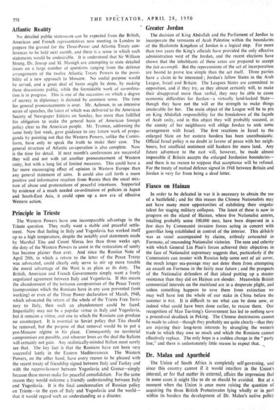' Greater Jordan
The decision of King Abdullah and the Parliament of Jordan to incorporate the remnants of Arab Palestine within the boundaries of the Hashimite Kingdom of Jordan is a logical step. For more than two years the King's officials have provided the only effective administration west of the Jordan, and the recent elections have shown that the inhabitants of these areas are prepared to accept the fait accompli.- But the repercussions of the act of incorporation are bound to prove less simple than the act itself. Three parties have a claim to be interested ; Jordan's fellow States in the Arab League, Israel and Britain. The Leagues States are committed to opposition, and if they try, as they almost certainly will, to make their disapproval more than verbal, they may be able to cause economic difficulties for Jordan—a virtually land-locked State— though they have not the will or the strength to make things intolerable for her. The main object of the League will be to pin on King Abdullah responsibility for the breakdown of the facade of Arab unity, and in this object they will probably succeed, as the enmity of her neighbours will oblige Jordan to seek some arrangement with Israel. The first' reactions in Israel to the enlarged State on her eastern borders has been unenthusiastic. Official Israel policy is no doubt in favour of peace with her neigh- bours, but unofficial sentiment still hankers for more land. Any future adventure to the east will, however, be made almost impossible if Britain accepts the enlarged Jordanian boundaries— and there is no reason to suppose that acceptance will be refused. For the treaty of mutual defence signed in 1948 between Britain and Jordan is very far from being a dead letter.










































 Previous page
Previous page